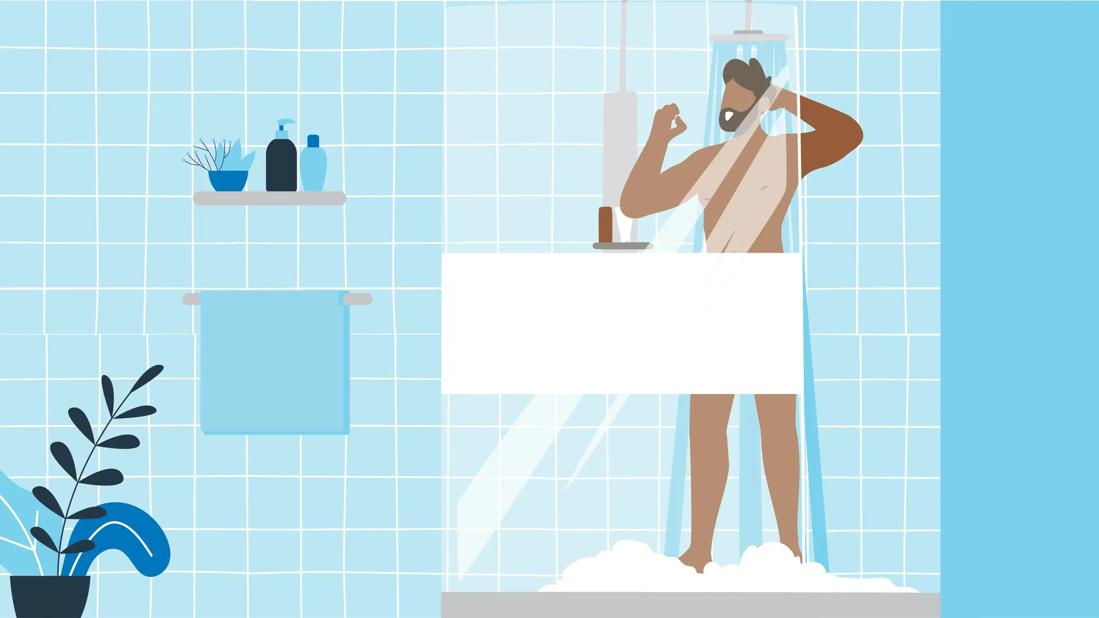An icy blast may boost mental clarity, increase circulation and give your skin a little glow — but don’t overdo it

Image content: This image is available to view online.
View image online (https://assets.clevelandclinic.org/transform/6b6509d1-edce-46e9-95ea-84f6e4811c95/man-shower-cold-1314424206)
Bearded man showering in blue bathroom
Goosebumps with benefits?
Advertisement
Cleveland Clinic is a non-profit academic medical center. Advertising on our site helps support our mission. We do not endorse non-Cleveland Clinic products or services. Policy
Sure, cold showers can feel like a rude wake-up call. But what if that icy blast actually did something good for you? According to family medicine physician Christopher Babiuch, MD, they might give your brain, body and mood a little jolt in the right direction — even if they’re not as intense as a dramatic cold plunge.
Cold showers aren’t just about toughing it out. They may help with circulation, focus and mood — and they’re a more accessible way to try out cold immersion therapy.
Dr. Babiuch recommends easing into the habit slowly. Jumping straight into freezing water might be too intense for most people.
“Acclimating yourself to the colder temperatures over time makes a lot of sense,” he says. Try gradually lowering the temperature over a few days. Start warm, then slowly cool things down until you’re spending the last few minutes under cold water.
How long should you stay in? Dr. Babiuch suggests using the same general guideline as cold plunges: Start with five minutes and work your way up to 10 minutes max. And while there’s no perfect time of day, a cold shower in the morning might be just the thing to help you wake up.
Cold showers aren’t a magic fix, but they may support your body in more ways than you might think. Here are a few of the potential perks.
Advertisement
That cold jolt you feel when cold water hits your skin? It kicks your circulatory system into high gear. Your body responds by sending blood to your core to protect vital organs, which, in turn, stimulates overall blood flow.
Better circulation means oxygen-rich blood gets delivered where your body needs it, helping you recover faster from workouts and potentially supporting conditions like diabetes or high blood pressure.
Increased blood flow from cold showers can help nourish your skin and clear out toxins. That’s a win for your skin’s health and glow.
It may also tighten your pores temporarily, which helps keep out dirt and oil, and could reduce acne or clogged pores. Splashing cold water on your face after cleansing is a quick, easy way to try this.
Cold showers don’t just wake up your body — they can refresh your mind, too. That initial shock triggers a wave of alertness that may help you feel more clear-headed and focused.
Research suggests that people feel more active, attentive and alert after cold-water immersion. Of course, that’s full immersion, but there may be an overall cold effect.
Cold showers might not beat an ice bath, but they may still help with muscle soreness.
“Some athletes use cold exposure after sports to aid in recovery,” says Dr. Babiuch. “Others do cold water swimming regularly for the benefits, plus exercise.”
Taking cold showers may help you dodge catching the latest … well, cold. Proponents say icy showers may train your immune system by activating stress responses that make your body more resistant.
Is there any truth to that theory? Possibly, according to one 2016 trial that found people who took cold showers called off work less often than those who didn’t.
Just like an ice pack, a cold shower can help take the edge off pain. Some people find that cold water helps with headaches, sore muscles or even insect bites.
While not a replacement for pain meds, it may offer short-term relief, especially for post-workout soreness. For a tension headache, try standing in a dark shower under cool water for a calming reset.
Your body works harder to stay warm in cold water, which means a temporary boost in calorie burn. That uptick in metabolism might support your overall fitness goals — just a little.
But don’t expect major weight loss from cold showers alone. “Cold showers aren’t going to be your best route to weight loss,” clarifies Dr. Babiuch. Consider it a small bonus, not a strategy.
Cold showers aren’t for everyone. While they’re generally safe for healthy people, certain conditions can make them risky. According to Dr. Babiuch, it’s important to listen to your body and avoid pushing past your limits.
Advertisement
Cold showers may not be a good idea if you:
Bottom line: Always ease into cold showers, especially if you’re new to them. And if you have any medical concerns, check with your healthcare provider before making cold showers part of your routine.
Advertisement

Sign up for our Health Essentials emails for expert guidance on nutrition, fitness, sleep, skin care and more.
Learn more about our editorial process.
Advertisement
Bathing once a day is the general guidance, but you could also have reasons to soap up twice a day or not at all
You’re sharing your sheets with dust mites, bacteria and lots of dead skin, so you’ll want to keep your bedding fresh
You may notice itching, redness and swelling after wearing or using laundered items
We don’t fully understand how cleanliness impacts immune system development, but we do know that preventing illness is important
This olive oil-based soap is generally mild and safe when diluted
It’s a wash — when you bathe is a personal preference
Try turning the heat down on the water and opting for a moisturizing soap
Research doesn’t show a link between the personal hygiene product and breast cancer
Although it could be used as a moisturizer, this new trend is not recommended
Communicating clear limits helps protect your time, energy and emotional well-being
High cholesterol can be genetic, but testing and treatment can lower your heart disease risk